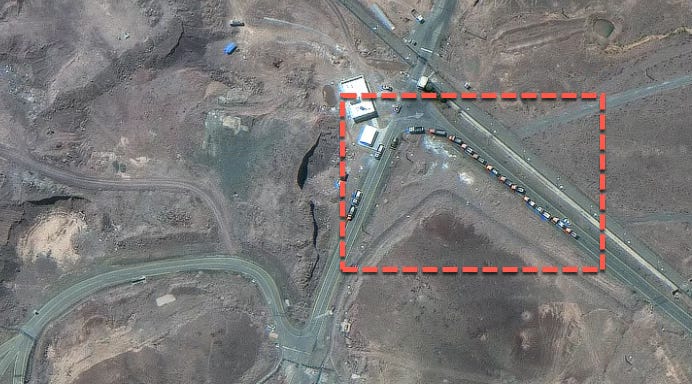New in SpyWeek: Rage Over Iran Intel, Knives Out for Tulsi, Pompeo Hit Plot
Welcome to SpyWeek, our weekly newsletter, where we look at news from the intersection of intelligence, foreign policy, and military operations.

TOTALLY OBLITERATED: President Trump and his administration spent the week rebutting a preliminary U.S. intelligence report that undermined his claim that the airstrikes he ordered “totally obliterated” Iran’s nuclear facilities. A classified Defense Intelligence Agency “Battle Damage Assessment,” issued a day after the strike, stated that the dozen bunker-buster bombs dropped by U.S. B-2 bombers failed to destroy the core components of the country’s nuclear program and likely only set it back by months. On Wednesday, CIA Director John Ratcliffe issued a statement saying that “new intelligence” from a “historically reliable and accurate source/method” showed the sites had been “severely damaged.” DNI Tulsi Gabbard went further, saying in a post on X that the new intelligence confirmed the sites had been “destroyed.” The embattled national intelligence chief was notably not present at a Thursday Senate briefing delivered by Defense Secretary Pete Hegseth, Ratcliffe and Dan Caine, during which the JCS chairman said “the U.S. began highly classified planning to destroy Iran’s Fordo nuclear complex in 2009, virtually as soon as the Iranians began to build it,” according to the Wall Street Journal. The FBI has launched an investigation to find out who leaked what the DIA called “a preliminary, low-confidence assessment—not a final conclusion.” The knives are out, meanwhile, for the ODNI, with no less than Tom Cotton, R-Ark, chairman of the Senate Intelligence Committee, proposing to slash the staff of the office by more than half, from 1600 to 650, NBC reported Friday. (See also our Michael Isikoff’s interview on this subject with Gregory Treverton, former chair of the National Intelligence Council.)
EYES ON THE GROUND: In a flash of frustration over the DIA report, President Trump may have revealed a classified detail: that Israel (or someone) had personnel on the ground confirming the results of a strike inside Iran.
“They have guys that go in there after the hit,” Trump said during a NATO summit in the Netherlands. “And they say it was total obliteration.” Sen. Markwayne Mullin, R-Okla., echoed that claim in a CNN interview, saying the U.S. intelligence community had “eyes on the ground, eyes on the target” who confirmed the strike’s success, unlike the DIA, which he said lacked in-country assets. Those “eyes” may belong to Task Force Orange (aka Grey Fox), a secretive unit that operates deep undercover inside denied areas. In his book Relentless Strike: The Secret History of Joint Special Operations Command, journalist Sean Naylor reported that Task Force Orange sent its operatives inside Iran in 2004 to find out whether fissile material was being produced at certain sites.
LEAK INVESTIGATION: The leak of the DIA report may ultimately curb intelligence sharing with Congress. Axios reported that the Trump administration plans to limit what it shares on Capitol Network (CAPNET), which allows intelligence specialists in Congress to access information from the intelligence community’s classified intranet (Intelink) and the CIA. The DIA's assessment on the Iran bombings went up on CAPNET late Monday. The next afternoon, CNN and then the New York Times reported the assessment.
URANIUM CONFUSION: Conflicting accounts are emerging over what happened to Iran’s stockpile of 400 kilograms of 60 percent enriched uranium. A leaked DIA report claims much of it was moved before the recent strikes and that little nuclear material was actually destroyed. But the White House is pushing back. Spokeswoman Karoline Leavitt said Thursday there’s “no indication” Iran relocated its stockpile before the operation, adding that U.S. officials are closely monitoring the sites. For a deeper dive, read SpyTalk Contributing Editor Jonathan Broder’s Wednesday night report at SpyTalk.

MOSSAD THANKS CIA: In a rare video address, Mossad Chief David Barnea declared that Israel had achieved what once seemed almost inconceivable in its war with Iran, claiming his country is now “a safer, more powerful state.” Barnea also gave a nod to the CIA, calling it Mossad’s “primary partner” in the conflict, and its director, John Ratcliffe, “who supported the Mossad in making the right decisions that ultimately enabled this campaign.” The unusually public statement signals growing confidence in Israel’s intelligence leadership following the attacks.
FBI INTEL CHIEF SIDELINED: NBC News’ Ken Dilanian reported that Tonya Ugoretz, a 24-year FBI veteran and current head of its Directorate of Intelligence, has been placed on administrative leave. The reason for the move is unclear. The FBI declined to comment, and Ugoretz did not respond. A former No. 2 in the FBI’s Cyber Division during the Trump administration, Ugoretz had just posted on LinkedIn about the 20th anniversary of the FBI’s intelligence branch—a post-9/11 creation designed to merge law enforcement and intelligence to prevent terrorist attacks. In February, ex-FBI agent Kyle Seraphim—now a close ally of Director Kash Patel—blasted Ugoretz on X, calling her an analyst, not an agent, and demanding both her removal and the dismantling of the intelligence division.
FBI REFOCUSES ON IRAN: Facing fears of Iranian retaliation for recent U.S. strikes, the FBI is shifting counterterrorism agents back to their original roles after months spent chasing undocumented immigrants under Trump directives. NBC News reports that Don Holstead, the assistant director for counterterrorism, issued guidance over the weekend, as Iran threatened to activate possible sleeper cells if the United States launched attacks. The change highlights growing concern that prioritizing immigration and drug cartels over national security has created critical security gaps. Insiders say the FBI’s small workforce has been stretched thin by politically driven reassignments. “It’ll only take one crisis to really stress the system,” one agent warned. Another quipped: “Guess they’re realizing this whole national security thing is important, after all.”
IRANIAN PLOT TO KILL POMPEO: In 2022 Iranian agents learned of the Paris hotel where former CIA Director and Secretary of State Mike Pompeo was staying and tried to assassinate him, according to a new book. 2024: How Trump Retook the White House and the Democrats Lost America, by Josh Dawsey, Tyler Pager and Isaac Arnsdorf, says “Iranian hit men tried to assassinate U.S. officials at least three times in the three years preceding Trump’s election, as his campaign for president ramped up, according to Friday’s account in The Washington Post. “Two of those attempts have been widely reported, but the incident involving Pompeo in Paris has not previously been disclosed.” In January, Trump withdrew security protection from Pompeo, John Bolton “and another top aide who were facing threats from Iran, which the New York Times reported at the time,” The Post noted. In a 2023 book, Pompeo himself wrote that the IRGC official charged with plotting to assassinate Bolton also sought a contract assassin to kill him.
IRANIAN NATIONALS NABBED: ICE arrested 11 Iranian nationals and one U.S. citizen over a 48-hour period in a nationwide sweep targeting individuals linked to criminal and potential national security threats. The arrests, which spanned nine states, come amid heightened tensions with Iran and a fresh DHS terrorism bulletin. (See below) Among those detained: Makari Saheli, a former member of Iran’s Islamic Revolutionary Guard Corps with alleged Hezbollah ties; Ribvar Karmi, an Iranian military sniper from 2018 to 2021, and Yousef Mehridehno, whose name appeared on a terrorist watchlist after entering the U.S. on a visa. Charges ranged from weapons and drug offenses to grand larceny. One American citizen was arrested for allegedly harboring an Iranian national and threatening ICE agents. While DHS says there’s no evidence of an imminent terror plot, the operation underscores growing concerns about Iran-linked actors operating inside the U.S. at a time of escalating geopolitical friction.
FBI FUMBLES SURVEILLANCE THREAT: A new DOJ Inspector General audit criticizes the FBI for its sluggish and disjointed response to the growing threat of everyday technology being used to track its agents, compromise operations, and expose sources. Despite elevating the issue to a “Tier 1” risk, the Bureau’s internal Red Team failed to identify key vulnerabilities or create a coherent, long-term mitigation plan, the IG said. The audit warns that known gaps in tradecraft, policy, and training remain unaddressed—and that future breaches could cost lives.
TERROR ALERT RAISED: The Department of Homeland Security issued a fresh terrorism bulletin warning of a “heightened threat environment” in the U.S. tied to escalating conflict between Israel and Iran. The alert—effective through Sept. 22—warns of potential violence inspired by foreign terrorist groups, Iran-backed operatives, or lone actors radicalized online. Multiple recent domestic terrorist attacks have been motivated by anti-Semitic or anti-Israel sentiment, and the ongoing Israel-Iran conflict could contribute to U.S.-based individuals plotting additional attacks. The bulletin also flags a growing cyber threat from Iranian hackers and urges Americans to lock down their networks. (See also “Iran's Cyber Army: Missing in Action,” by Jonathan Broder and Jeff Stein.)
CIA VET JOINS PENTAGON: The Senate has confirmed Daniel Zimmerman, a 16-year CIA veteran, as the new Assistant Secretary of Defense for International Security Affairs. Zimmerman previously delivered the President’s Daily Brief and served as a senior member of the Trump White House team that crafted the Abraham Accords under Jared Kushner. Since Jan. 2024, Zimmerman has been working as an executive branch detailee in the office of Sen. Bill Hagerty (R-TN). His appointment adds another intelligence hand to the Pentagon’s top ranks as tensions in the Middle East remain high.
ISIS FANBOY BUSTED: A 33-year-old California man is facing charges of attempting to provide material support to a foreign terrorist organization. According to court documents, Ammaad Akhtar has been communicating online with an FBI undercover employee “controlled persona”—either an undercover agent or a confidential source—whom Akhtar believed was a member of ISIS. Akhtar voiced his support for ISIS and jihad, expressed a desire to travel overseas to join and fight with ISIS, and stated a desire to send guns and money to ISIS. In a face-to-face meeting with an FBI undercover employee, Akhtar allegedly provided clothing, binoculars, $400 cash, two loaded firearms, and six additional magazines. He later swore bayat (a pledge of loyalty) to ISIS.
BACKPACK OF SECRETS: A 64-year-old Pentagon employee has been accused of hoarding classified documents in her Alabama home—and even in her backpack. Federal agents raided the Huntsville residence of Ewa Ciszak, a civilian employee with the Missile Defense Agency, and allegedly found multiple documents marked up to the Secret level. “Some of the documents had been placed in her personal backpack that day and transported directly from MDA to her home,” the DoJ said. Ciszak, who joined the agency in January 2023, now faces charges of unauthorized removal and retention of classified material. She told agents she was using them to work on a presentation for her work, according to local TV station WAFF.
MI6 MOLE HUNT: U. K. intelligence agencies and the CIA spent 20 years looking for a Russian mole in MI6 beginning “in the 1990s” but came away empty handed, according to a report Friday in the Guardian. “The extensive hunt for the alleged mole, called Operation Wedlock, was run by MI6’s sister agency, MI5, which deployed a team of up to 35 surveillance, planning and desk officers, who travelled across the world” on the tail of the suspect, including to the Middle East, where the CIA provided a safe house for the super-sensitive probe, said the Guardian, drawing on a new book by former BBC security correspondent Gordon Corera, The Spy in the Archive: How One Man Tried to Kill the KGB. “We thought we had another Philby on our hands,” a source told the Guardian, but “MI5 never got the conclusive proof it was looking for.” The focus on the suspect ended in 2015, the paper said, adding it’s possible MI6 “still has a mole to find.” The Corera book covers well trod ground on “how one man - Vasili Mitrokhin - turned first disaffected dissident and then traitor to the KGB, stealing the most secret Soviet archives and smuggling them to the West,” according to the publisher’s blurb.
Pocket Litter
Israeli officials urged citizens to disconnect Internet-connected security cameras, warning that Iran may be exploiting them to gather real-time intelligence and adjust missile targeting. (The Record)
Jeff Stein contributed to this story.
Is there something we missed? Or something you would like to see more of? Send your tips, corrections, and thoughts to SpyTalk@protonmail.com.







great read. thank you
The man from orange can't seem to understand that a series of very successful military strikes does not mean that Iran's quest for a nuclear program has somehow disappeared.